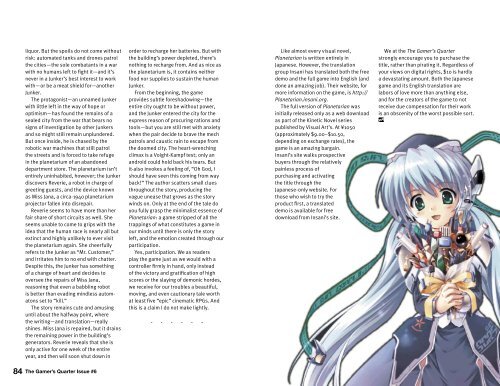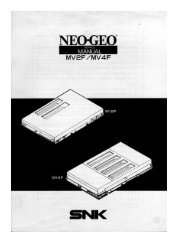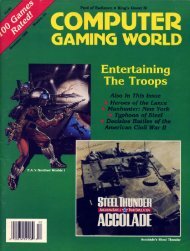The Gamer's Quarter - Issue #6 - TextFiles.com
The Gamer's Quarter - Issue #6 - TextFiles.com
The Gamer's Quarter - Issue #6 - TextFiles.com
You also want an ePaper? Increase the reach of your titles
YUMPU automatically turns print PDFs into web optimized ePapers that Google loves.
84<br />
liquor. But the spoils do not <strong>com</strong>e without<br />
risk: automated tanks and drones patrol<br />
the cities—the sole <strong>com</strong>batants in a war<br />
with no humans left to fi ght it—and it’s<br />
never in a Junker’s best interest to work<br />
with—or be a meat shield for—another<br />
Junker.<br />
<strong>The</strong> protagonist—an unnamed Junker<br />
with little left in the way of hope or<br />
optimism—has found the remains of a<br />
sealed city from the war that bears no<br />
signs of investigation by other Junkers<br />
and so might still remain unplundered.<br />
But once inside, he is chased by the<br />
robotic war machines that still patrol<br />
the streets and is forced to take refuge<br />
in the planetarium of an abandoned<br />
department store. <strong>The</strong> planetarium isn’t<br />
entirely uninhabited, however; the Junker<br />
discovers Reverie, a robot in charge of<br />
greeting guests, and the device known<br />
as Miss Jana, a circa-1940 planetarium<br />
projector fallen into disrepair.<br />
Reverie seems to have more than her<br />
fair share of short circuits as well. She<br />
seems unable to <strong>com</strong>e to grips with the<br />
idea that the human race is nearly all but<br />
extinct and highly unlikely to ever visit<br />
the planetarium again. She cheerfully<br />
refers to the Junker as “Mr. Customer,”<br />
and irritates him to no end with chatter.<br />
Despite this, the Junker has something<br />
of a change of heart and decides to<br />
oversee the repairs of Miss Jana,<br />
reasoning that even a babbling robot<br />
is better than evading mindless automatons<br />
set to “kill.”<br />
<strong>The</strong> story remains cute and amusing<br />
until about the halfway point, where<br />
the writing—and translation—really<br />
shines. Miss Jana is repaired, but it drains<br />
the remaining power in the building’s<br />
generators. Reverie reveals that she is<br />
only active for one week of the entire<br />
year, and then will soon shut down in<br />
<strong>The</strong> Gamer’s <strong>Quarter</strong> <strong>Issue</strong> <strong>#6</strong><br />
order to recharge her batteries. But with<br />
the building’s power depleted, there’s<br />
nothing to recharge from. And as nice as<br />
the planetarium is, it contains neither<br />
food nor supplies to sustain the human<br />
Junker.<br />
From the beginning, the game<br />
provides subtle foreshadowing—the<br />
entire city ought to be without power,<br />
and the Junker entered the city for the<br />
express reason of procuring rations and<br />
tools—but you are still met with anxiety<br />
when the pair decide to brave the mech<br />
patrols and caustic rain to escape from<br />
the doomed city. <strong>The</strong> heart-wrenching<br />
climax is a Voight-Kampf test; only an<br />
android could hold back his tears. But<br />
it-also invokes a feeling of, “Oh God, I<br />
should have seen this <strong>com</strong>ing from way<br />
back!” <strong>The</strong> author scatters small clues<br />
throughout the story, producing the<br />
vague unease that grows as the story<br />
winds on. Only at the end of the tale do<br />
you fully grasp the minimalist essence of<br />
Planetarian: a game stripped of all the<br />
trappings of what constitutes a game in<br />
our minds until there is only the story<br />
left, and the emotion created through our<br />
participation.<br />
Yes, participation. We as readers<br />
play the game just as we would with a<br />
controller fi rmly in hand, only instead<br />
of the victory and gratifi cation of high<br />
scores or the slaying of demonic hordes,<br />
we receive for our troubles a beautiful,<br />
moving, and even cautionary tale worth<br />
at least fi ve “epic” cinematic RPGs. And<br />
this is a claim I do not make lightly.<br />
Like almost every visual novel,<br />
Planetarian is written entirely in<br />
Japanese. However, the translation<br />
group Insani has translated both the free<br />
demo and the full game into English (and<br />
done an amazing job). <strong>The</strong>ir website, for<br />
more information on the game, is http://<br />
Planetarian.insani.org.<br />
<strong>The</strong> full version of Planetarian was<br />
initially released only as a web download<br />
as part of the Kinetic Novel series<br />
published by Visual Art’s. At ¥1050<br />
(approximately $9.00–$10.50,<br />
depending on exchange rates), the<br />
game is an amazing bargain.<br />
Insani’s site walks prospective<br />
buyers through the relatively<br />
painless process of<br />
purchasing and activating<br />
the title through the<br />
Japanese-only website. For<br />
those who wish to try the<br />
product fi rst, a translated<br />
demo is available for free<br />
download from Insani’s site.<br />
We at the <strong>The</strong> Gamer’s <strong>Quarter</strong><br />
strongly encourage you to purchase the<br />
title, rather than pirating it. Regardless of<br />
your views on digital rights, $10 is hardly<br />
a devastating amount. Both the Japanese<br />
game and its English translation are<br />
labors of love more than anything else,<br />
and for the creators of the game to not<br />
receive due <strong>com</strong>pensation for their work<br />
is an obscenity of the worst possible sort.<br />
Running Article Footer 85

















